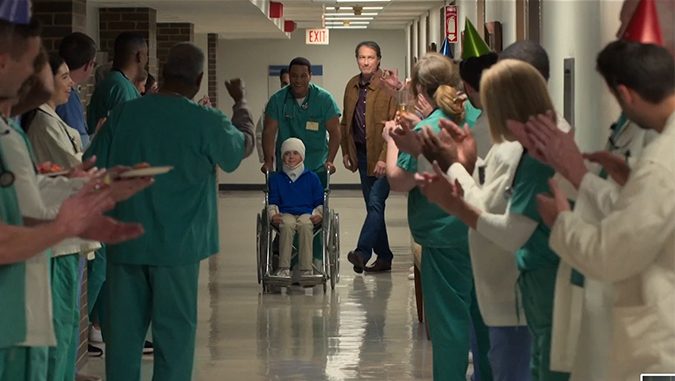
MPAA Rating: PG
Reel Rating: 4 out of 5 reels
By this point in 2025, there are dozens of Christian films about heroic individuals overcoming difficult obstacles through personal faith and the charity of those around them (there’s even one film titled Overcomer).
Soul on Fire, though not a masterpiece, is better than most and demonstrates a level of cinematic sophistication that the genre has been gradually achieving on a more consistent basis. This story is a wonderful testament to perseverance and hope amid terrible obstacles, but also something deeper: the conversion of the soul.
John is a typical ’80s Missouri kid. He is curious, rebellious, likes listening to the radio, and is obsessed with playing for the Cardinals baseball team someday. These dreams come crashing down when he foolishly decides to light some gasoline with matches in the garage. Not only does most of the house burn down, but he receives third-degree burns over nearly all his body.
Initially given no chance of survival, John defies the odds and returns home several months later after a grueling rehabilitation process. Yet, he is forever changed physically. His fingers on both hands had to be amputated, and he has burn marks everywhere except his face (which was saved by his little sister pouring water on him). Rehabilitation and returning home are only the first hurdles.
As he goes through life relearning everything, he also must undergo a rehabilitation of the soul, which might not have taken place except for the fire.
The most heart-wrenching aspect of the film involves poor John’s horrific suffering from his injuries, which the film handles with tact but also does not sugarcoat. He must undress and redress all his bandages (which cover his whole body) every day. His nurses force him to start bending his limbs, causing him to scream in excruciating pain (depicted soundlessly, thankfully, behind glass doors).
Yet despite this heartbreak, he has a lot of help. No one ever blames him for the fire or gives up on his recovery. His parents are always around: reading stories, praying for healing, or just sleeping. The doctors are patient, honest, and encouraging. He is even visited by the legendary announcer Jack Buck (William Macy), who takes a special interest, inviting him to Busch Stadium to meet players multiple times. Suffering is always difficult, especially for children, but it gives others an opportunity for charity. In times of trouble, communities come together.
As John grows and attends college, he learns to manage his disability but still suffers from invisible wounds. He really likes Beth (Masey Stanley) but won’t ask her out because he is sure she would reject him due to his appearance. A year later, after she has moved on, he finally asks her on a date, but she passes. “Why didn’t you ask me out before?” she questions. He shrugs and holds up his stumped hands. “Don’t ever underestimate me like that again,” she says with a frown.
It was good they did not date at that point; John was not ready to be a husband and a father. He was captive to the lie that his injuries made him unlovable and incapable of anything great. Later, when he accepts God’s grace, he does break out of the friend zone, and they eventually marry.
Something that comes out strongly in Soul on Fire (and another recent film, East of Wall) is the beauty of God’s work within the ugliness of the world’s struggles. John’s burn scars and misshapen hands are an affront to the natural order. Yet God not only accepts us in our brokenness, but our poverty gives him glory. As a father of six children under twelve, my small house is constantly in chaos with spilled juice, broken toys, pen marks on walls, and a budget that is always strained. This has always given me, someone who prides himself on cleanliness and order, an intense feeling of anxiety and fear that I am not living up to my vocation. Yet I have recently come to the knowledge that it is a natural outcropping of the blessing of a large family.
Because of his wounds, both physical and spiritual, John can, with St. Paul, “boast of his weakness.” The cross is not a sign of weakness but of exaltation.
Soul on Fire is a bit formulaic at times, but it stands out from more mediocre Christian films because of its stellar acting and compelling narrative. It’s easy to view films like these as sappy movies with predictable and happy endings, but it could have come out quite differently.
First, John succeeded due to the intervention of hundreds of people. Second, everyone—whether our challenges are great or small—is called to a conversion of spirit.
If we do this, we will be a soul on fire—not one that destroys but one that purifies others for the glory of God.
If you value the news and views Catholic World Report provides, please consider donating to support our efforts. Your contribution will help us continue to make CWR available to all readers worldwide for free, without a subscription. Thank you for your generosity!
Click here for more information on donating to CWR. Click here to sign up for our newsletter.

Leave a Reply
You must be logged in to post a comment.